 By Chase Kahn
By Chase KahnMonday, August 31, 2009
Moving Weekend
 By Chase Kahn
By Chase KahnThursday, August 27, 2009
"Having Tea with an English Lady"



Tuesday, August 25, 2009
"Where's Lo Pan?"
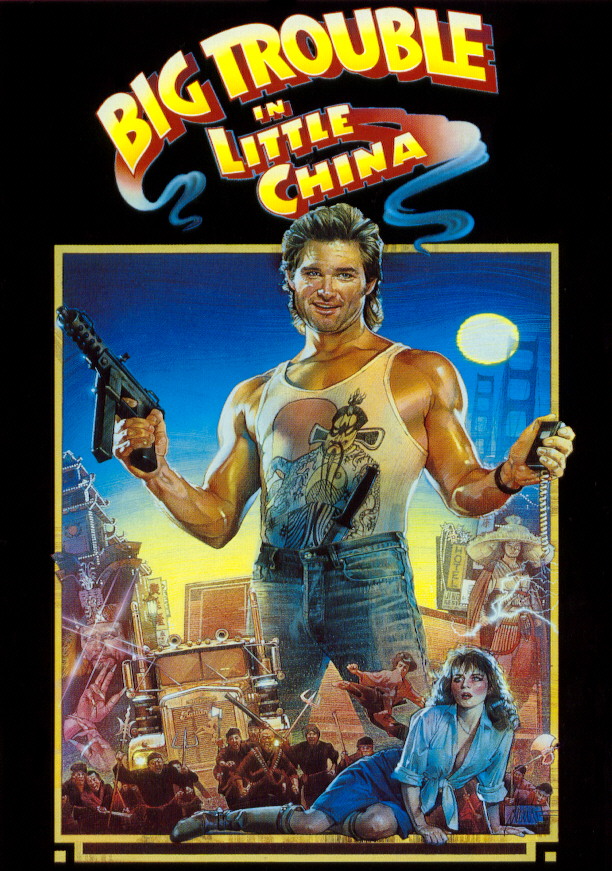

Malick on Blu

Monday, August 24, 2009
'Bioshock' Adaptation Up Again
 By Chase Kahn
By Chase Kahn'Inception' Teaser -- Upcoming Movies
 By Chase Kahn
By Chase KahnSunday, August 23, 2009
Slow-Mo Netflix
 By Chase Kahn
By Chase KahnSaturday, August 22, 2009
'Basterds' Opens Big
 By Chase Kahn
By Chase KahnEternal Youth: 'Dorian Gray'
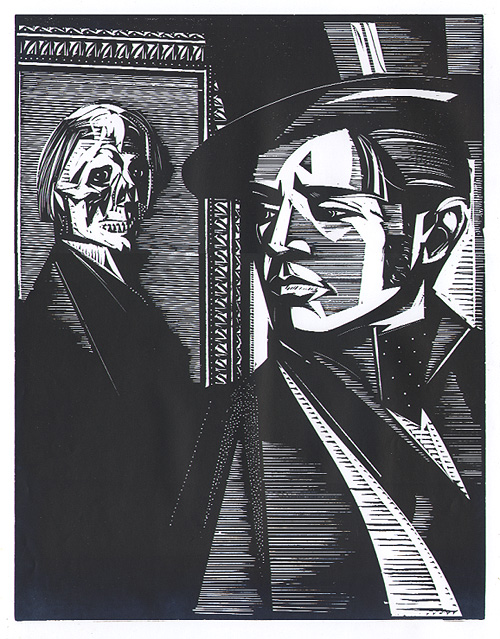 By Chase Kahn
By Chase KahnFriday, August 21, 2009
Review: 'Inglourious Basterds' (B)
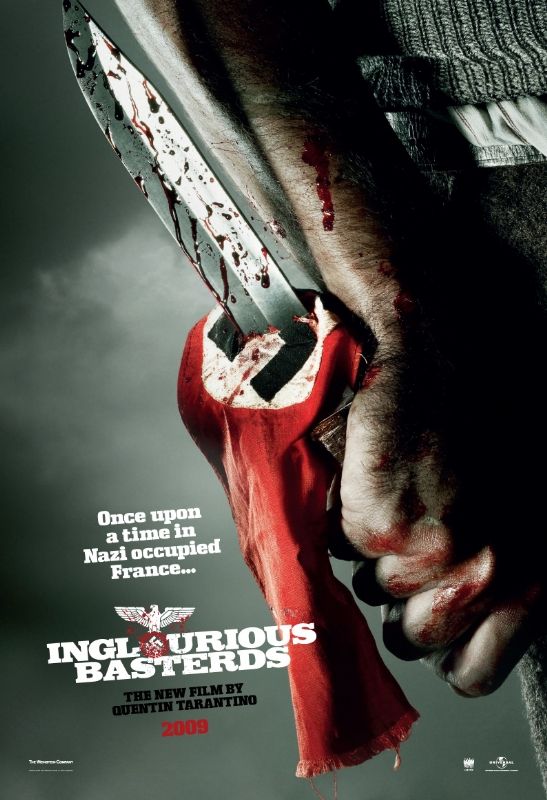 By Chase Kahn
By Chase KahnWhen gunfire arises in Quentin Tarantino's Inglourious Basterds, it doesn't just crackle or pop, it explodes. Clothing linens flutter about, shrapnel and sawdust from nearby walls, tables or floors suffocates the air and vivid red blood -- the same red that adorns the iconic Nazi flag -- erupts like a fireworks show's grand finale, abrasively but appropriately deafening.
Teasing "Inception"
 By Chase Kahn
By Chase Kahn"Shutter" Stunner
 By Chase Kahn
By Chase Kahn"Hancock 2"?
 By Chase Kahn
By Chase KahnThursday, August 20, 2009
Roger Ebert is a Basterd
 By Chase Kahn
By Chase KahnMiriam Hopkins Day
 By Chase Kahn
By Chase KahnWednesday, August 19, 2009
'Heaven' Scarce Rollout
 By Chase Kahn
By Chase Kahn'Severed Ways' DVD
 By Chase Kahn
By Chase KahnTuesday, August 18, 2009
"Up in the Air" One-Sheet

Review: 'The Time Traveler's Wife' (C+)
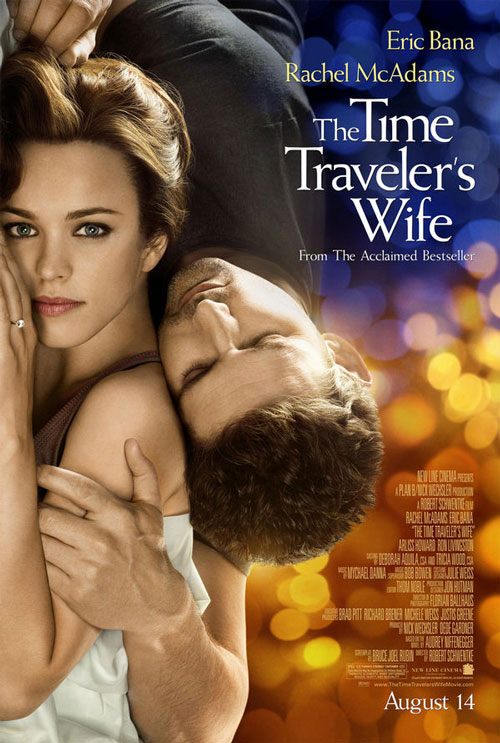
Monday, August 17, 2009
IFC Hits Criterion

Catching Up on DVD: 'Wonder Boys' (2000)
In between making early 90’s thrillers (The Hand That Rocks the Cradle, The River Wild) and venturing into contemporary Nancy Meyers territory (In Her Shoes, Lucky Me), Curtis Hanson peaked in 1997 with his neo-noir police saga L.A. Confidential. He would follow it up three years later with his 2000 box-office flop Wonder Boys, an exceptional yet underrated and seldom seen film that grossed a mere $19 million domestically.
Michael Douglas plays professor and novelist Grady Tripp, in love with the school chancellor (Frances McDormand) and a mentor to students James Leer (Tobey Maguire) and Hannah Green (Katie Holmes). All the while being hassled by his editor (Robert Downey Jr.) who needs Grady to finish his book as badly as Grady does – for reputations’ sake.
To make matters worse, Grady’s most troubling student – the brilliant but reserved James Leer – has just shot his boss’s dog to death at a party, which now finds its resting place in the back of Grady’s 1966 Ford Galaxy.
Curtis Hanson's Wonder Boys is essentially a darkly comic ensemble film about finding your purpose, taking action and pushing forward to achieve it – don’t sit idle wallowing in your daily routine. This notion is mirrored in Grady’s unfinished novel, which is pushing 3000 pages without an end in sight. Grady doesn’t have writer’s block, as he describes, he just, “can’t stop”.
It’s also very much fundamentally about the relationship between Grady (Douglas) and his most talented yet troubled student James (Maguire). Hated by his fellow students and quietly “spooky”, he makes his home out of a bus station, snacking on cheese sandwiches out of the vending machine for food. One day, while “rescuing” James from his grandparent’s basement, Grady and his editor, Terry (Robert Downey Jr.) run into a freshly typed paragraph still rolled around the typewriter.
“His heart, once capable of inspiring others so completely could no longer inspire so much as itself. It beat now only out of habit,” it reads. Grady isn’t rescuing James, James is rescuing him.
Douglas finds the twisted ironic center of this character and brings real emotion and humor to him. His filthy and tainted pink robe and leathery, wrinkled brows depict the years of stagnant progression, or lack there of, that have taken a toll on his life which is now clearly in its latter half.
Wonder Boys is a hidden gem, a great film widely avoided by audiences and awards alike upon its release.
Sunday, August 16, 2009
Early Review: 'Bright Star' (B)
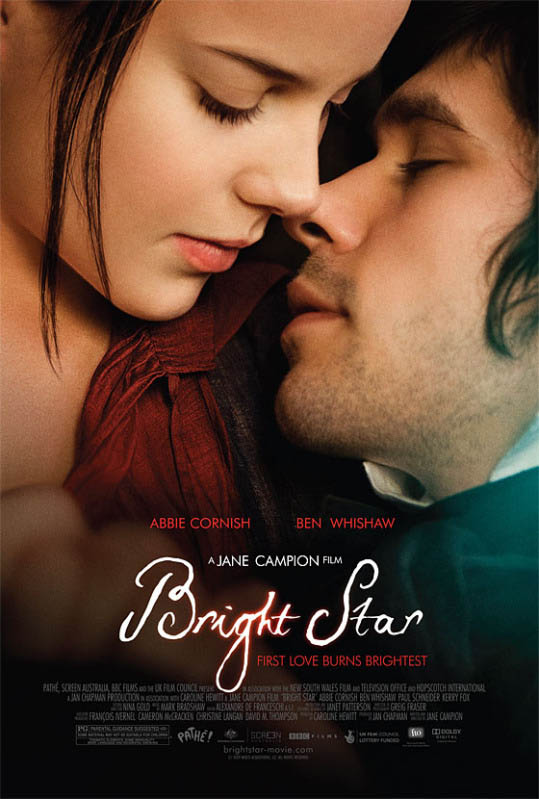 By Chase Kahn
By Chase Kahn
"Bring It On" Saves DVD Sales
 By Chase Kahn
By Chase KahnFriday, August 14, 2009
Review: 'District 9' (B-)
 By Chase Kahn
By Chase KahnNeill Blomkamp’s District 9 takes this premise, this politically charged allegory, and makes it into a feature-length science-fiction action film that elicits mixed results. On one hand, its implementation of visual effects into live-action is seamless and inspired, creating a visceral and enjoyable experience. On the flip side, its politics are occasionally hypocritical and its genre elements partly conventional. Call it a wash, an enjoyable disappointment.
When Wikus (Sharlto Copley, think South African Christian Bale), a goofy and unassuming MNU employee, is picked to carry out the eviction notices in order to move the prawns (aliens) into a new facility, he gets more than he’s bargained for – a face full of fuel that implants in himself a large dose of prawn DNA. Wait, what? Ah, just go with it.
Now Wikus, an employed ambassador to the segregation of these filthy and unwanted visitors, these public enemies, is slowly becoming one of them. Through this initial transformation, he becomes acutely aware of the cruelty and inhumanity being lashed down upon the poor prawns and himself.
Of course, Blomkamp is condemning not only the apartheid history of South Afrika, but racial segregation in general, using Wikus as his test dummy – you don’t like these people? – become one of them and find out what it’s like from their point of view.
District 9 opens with a barrage of faux news reports, interviews and documentary footage of Wikus’ journey to the camp in a barrage of tedium. The first half of the film loses steam quick with its apparent need to actively impress us in a bouquet of gimmicks. Fortunately, once Wikus’ transformation is underway, the thing kicks into full-gear – a balls-to-the-wall chase film with political intrigue and action to spare.
Unfortunately, it’s not enough to overcome all of District 9’s faults and, in fact, just creates new ones.
While Wikus’ moral and physical journey is thrilling and quite emotional at times, he squares off against a bland, archetypical and predictably bald and chiseled government-hired badass who stays alive just long enough for the film to reach its desired length. Additionally, by portraying a group of militant Nigerians as scarred, ruthless snarling dogs, Blomkamp is inadvertently exposing the kind of racism his film is theoretically divulging.
Thursday, August 13, 2009
Catching Up on DVD: '17 Again'
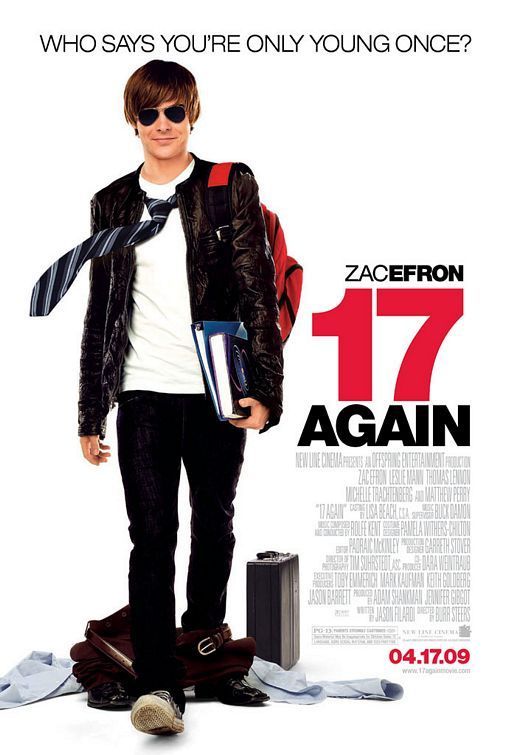 By Chase Kahn
By Chase KahnReview: 'Tetro' (B)
 By Chase Kahn
By Chase KahnAfter an inventful and ineffaceable title sequence, Benny (Alden Ehrenreich) is wandering down the desolate black and white Buenos Aires streets searching for his brother’s home. He has the address tucked in his hands, pearly white to match his spotless sailing uniform. In effect, he’s searching not just for his brother, but for his mystified and unattainable life.
His brother is Angelo (played by Vincent Gallo), a mysterious, hotheaded and secretive ex-writer who now goes by the name Tetro. Immediately, Benny wants to know what happened – why hasn’t he seen his brother since he went away oh so many years ago? -- but Tetro isn’t so forthcoming. He tells Benny to leave it alone and drop it because he’s no longer a part of it. But come on, things wouldn’t be so dramatic if he did, and believe me, Tetro is nothing if not overly dramatic.
Francis Ford Coppola’s film is a slightly drawl and trite familial melodrama full of secrets, love, bonding and betrayal. An engaging (if long-winded), mindful and most interesting film, Tetro is an operatic sensationalist drama that wears its heart on its sleeve even as it somewhat wears thin. However, it’s so visually and artistically keen that any faults it may have appear like a faint memory in one of Tetro’s numerous flashbacks.
One day, while rifling through his trunks, sitting high atop heavy armoires and adorned with plastic sheaths, Benny learns that Tetro has written a stage play -- it's based on his life, therefore Benny's childhood. Secrets are uncovered, bonds are broken and formed and the past is brought to life through his play, titled "Wander Lust", which doesn't have an ending yet. Benny is waiting for it so he can finish the story and therefore, his life.
It becomes a potent metaphor through the remainder of the film, bringing to light the fact that Tetro and Benny are both living – and always have been – in some sort of a heavily dramatized play about family, past, belonging and truth.

After all, Tetro is shot in vivid black and white with an emphasis on camera placement and lighting. It’s the film’s defining quality and it's something beautiful to behold. Mihai Malaimare Jr. (Youth Without Youth) lenses the film to Coppola's arresting images and the two create some undeniably indelible compositions. A moth battering around a light bulb and a play of "Fausta", in which Benny, Tetro and his girlfriend Miranda attend, are certainly images and sounds that I can't get out of my head.
Alden Ehrenreich’s performance as Benny left a lasting impression as well, but for all the wrong reasons. He can’t carry the weight of the dramatic scenes, coming off as whiny or squeaky and he can’t bring any subtle charm to the character without resorting to a sly smile repeated on one-too many occasions.
Vincent Gallo as the titular character is a more interesting brew. He displays the brutish and hellish temper of Tetro with shit-storming authenticity as we see his eyeballs steady and his lips tighten, ready to implode. During a key flashback sequence at a mental institution pass-the-mike routine, we can’t help but feel the weight of the image upon his frail existence and unshaven cheeks, of the moth bouncing off the light, making a metallic ticking sound as it does, as if someone was tapping a needle.
Coppola (now 70) has long since resided from his glory days to now being a hermit of independent experimentation. He's in full swing right now with Tetro, a film with a lot of great ideas that ultimately feels fundamentally archaic in its writing. It’s not a home run by any means, but it’s an interesting film by one of our masters of old.
Yuck: 'Amelia' Poster

Catching Up on DVD: 'Push'
 By Chase Kahn
By Chase KahnKorea Submits 'Mother'

Tuesday, August 11, 2009
Review: 'In the Loop' (A-)
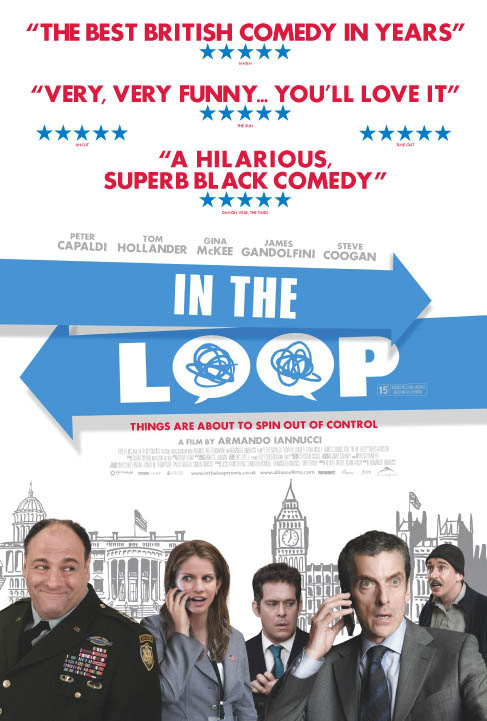 By Chase Kahn
By Chase Kahn2.0
I got tired of fighting each and every one of my posts until they looked just right, so I've completely changed my template and color scheme. The other reason was that I looked at my site through Firefox, and it looked like hell. Some posts were short, some long, pictures out of place. I'd had enough.
Monday, August 10, 2009
The Third Dimension -- A Madhouse
 By Chase Kahn
By Chase KahnIf you've gone to a cineplex in the last two years, you know we are in the midst of a bona-fide, gold rush-influx of 3D movies. My Bloody Valentine 3D, Coraline, The Jonas Brothers 3D, Monsters vs. Aliens, Ice Age: Dawn of the Dinosaurs and Up have all been released this year under the format.
Granted, some of these movies have been extremely successful financially, but what percentage of moviegoers saw them in a digital 3D theater? How about knowingly saw it in a 3D theater? Now I'll admit I exist in the other half of the movie world, the minority. I write a movie blog. But the future of 3D movies scares me -- what if, god help us, it becomes the standard? What if 2D films are looked upon the same way that silent or black-and-white films are now?
First off, let me state my case. I don't absolutely hate 3D -- I think it has a place in this world as an artistic tool (Coraline) or once in a while diversion. In reality, what ends up happening is that a) execs/directors/studios, in an attempt to rationalize their use for 3D, will embellish certain areas of a script/story in order to create visually-oriented sequences (anything by Robert Zemeckis), or b) will apply a 3D sheen as a cover-up for a lesser product (Journey to the Center of the Earth).
Not to mention that 3D viewing in general is a pain in the ass. Viewing angles are limited, the glasses put you into a chronic state of weariness, head-fatigue and migraines and the recycling and re-using of glasses is disturbingly germ-welcoming. Oh yeah, it's also more expensive.
This extra-dimensional movement seems to be lead by Dreamworks Animation CEO Jeffrey Katzenberg and Avatar director James Cameron. Every time I hear these guys make headlines claiming that 3D will soon be the standardized form of the medium, I think, "Okay, great. Does anybody actually want this?" I hear more negativity directed towards 3D these days than I do "Michael Bay Sucks" posts -- certainly more than those who approve it.
Which isn't to say that I'm not excited about Avatar, but I'd be more excited for a new two-dimensional Cameron film.
Just throw alliances out the window for a second -- who cares if you like 3D or not -- does every movie need to be demensionalized? Do we need Funny People, Adventureland and A Serious Man in 3D? Of course not, it's madness. Keep the goons and the popcorn-munchers happy with their interactive, digitized fix (i.e. 5-6 pictures a year) and leave the rest alone. I'd like to hear what Paul Thomas Anderson, Alfonso Cuaron and the Coen Brothers think of 3D. I think they'd fall in line with the rest of us.
Classic Rewind: 'Captain Horatio Hornblower' (1951)

Raoul Walsh's epic, romanticized swashbuckler Captain Horatio Hornblower is a classic star vehicle for the great Gregory Peck and one of the greatest swashbucklers ever made -- alongside Michael Curtiz's Captain Blood (1935) and The Adventures of Robin Hood (1938).
Originally slated as a star vehicle for Warner Brothers' in-house, chiseled, dreamy and bankable action star Errol Flynn -- David O. Selznick ended up loaning out Gregory Peck to the studio after Vincent Sherman's Adventures of Don Juan (1948), which starred Flynn, was a box-office failure and signaled the beginning of the end for the former heavyweight Warner Bros. icon.
Based on C.S. Forester's novels, starring the fictional and titular Horatio Hornblower, a Royal Navy captain during the Napoleonic Wars, Raoul Walsh's film is a gorgeously produced, sprawling tale of the captain's escapades and cunning judgements and heroics during this period of turmoil at sea.

Filmed in seamless Technicolor and on a stunning transfer by Warner Home Video (DVD released in 2007), Captain Horatio Hornblower looks better than ever, and there's hardly a blemish in Walsh's numerous actions set pieces.
Transitions between sound stage, models, and exterior oceaning shooting is spotless, and the amound of carnage inflicted on screen is palpable, brutal and real. Never-the-less, the film is certainly a Walsh/WB production from start to finish. A predictable forbidden romance (with Virginia Mayo), a likeable, larger-than-life and strappingly handsome hero (Gregory Peck), and a fictional, idealized reenactment of an historic war-time event.
If your a victim for the Warner Bros. romanticized swashbuckler (like me), where the heroes are square-jawed and stoic and the women, even during bouts of yellow fever, are glamorous and good-natured, and the guy always wins the war and gets the girl, Captain Horatio Hornblower is one of the best.
Sunday, August 9, 2009
Bigelow's New Gig
The critical and mild box-office success of Kathryn Bigelow's fantastic Iraq War drama, The Hurt Locker (and likely a bounty of Academy Awards nominations) has already boosted demand for the 57 year-old director.
She's set to reunite with Hurt scripter Mark Boal on Triple Frontier -- being described as, "a high-stakes ensemble action/adventure project".
"Set in the notorious border zone between Paraguay, Argentina and Brazil where the Igazu and Parana rivers converge -- making "la triple frontera" difficult to monitor and a haven for organized crime". Very exciting news -- production set to begin next year.
'Election' Day
 n is essentially an ensemble film centered around a three-person election for class president at Carver High School and a history teacher, Jim McAllister (Matthew Broderick), who oversees, supervises and takes an active role in the outcome. I'd say a loose ensemble film in that Broderick's Jim is essentially the main protaganist, but when three other characters have their own voiceovers and subplots, it's tough to write it off as such.
n is essentially an ensemble film centered around a three-person election for class president at Carver High School and a history teacher, Jim McAllister (Matthew Broderick), who oversees, supervises and takes an active role in the outcome. I'd say a loose ensemble film in that Broderick's Jim is essentially the main protaganist, but when three other characters have their own voiceovers and subplots, it's tough to write it off as such. 'Franklyn' on DVD

Saturday, August 8, 2009
Review: 'The Cove' (B)

It's partly a covert-ops operation, partly a heavy eco-friendly activist picture, and also an indictment of the Japanese culture holding on to a misplaced ideal of an historic past as a national empire. In other words, the Japense government and the IWC (International Whaling Committee) want to keep killing dolphins and whales because, a) they always have, b) it's profitable and c) because there is serious opposition against them and they wrongly look to their stubborness and desperate corruptness as a form of cultural preservation.
Friday, August 7, 2009
Review: 'A Perfect Getaway' (C)

Milla Jovovich (Resident Evil) and Steve Zahn (Rescue Dawn) play two newlyweds on their honeymoon in Hawaii. They meet two sketchy jungle-dwellers, played by Chris Hemsworth (Star Trek) and Marley Shelton (Planet Terror) who may or may not be the two killers of a couple from Honolulu -- just recently reported. Meanwhile, Timothy Olyphant (Hitman, Live Free or Die Hard) and Kiele Sanchez ("Lost") are another possible pair of Tarzan and Jane-like lovers who are suspiciously brutish.
It's Got To Stop

Thursday, August 6, 2009
Review: 'Public Enemies' (A)
(originally reviewed on 06/30/09) -- Face-to-face are notorious outlaw John Dillinger (Johnny Depp) and FBI agent Melvin Purvis (Christian Bale) -- the former behind bars, the latter outside of them -- or is it the other way around? Dillinger upstages him by breaking into Purvis' one weakness: his repugnance and untested psyche towards the loss of human life. "It's hard the first time", Dillinger taunts.
So sets off the fuse to the clash of the titans, the hunter versus the hunted -- who are both played as sympathetic despite their representative factions. Purvis represents the cruel, no-holds, blossoming and slimy system of justice while Dillinger is the gun-toting, mischievious and against-the-system criminal. Both men stand out in their profession, providing targets for audience sympathy and understanding.
Director Michael Mann (Heat, The Insider) is at home here in this battleground of thievery and outlaws taking on lawmen who may be equally as smug and disreputable. The film is flooded with supporting characters who are given maybe a glance or two, but the action and the camera are squarely focused on the film's two leads, plus Dillinger's fresh catch, Billie Frichette -- played exceedingly well and glamorously by Marion Cotillard -- as a defiant and petulant woman who is attracted to the covetousness and protective allure of her outlawed gunman.
Mann's gangster saga is not traditionally filmed -- here he has opted for an ultra-slick, ultra-sharp high-definition digital look that turns Public Enemies from film to stark reality -- period to contemporary. Gunshots looks like strobe lights in the night and bullets visibly skatter and shred through obstacles. It's a bold stroke by an artist pushing the genre and as a result, the film is a visual powerhouse -- an aesthetically arousing portrait of a bygone era and an anchor to the film's almost strict and no-frills narrative.
Public Enemies is decidedly straightforward and narrow -- as I said, supporting characters like Pretty Boy Floyd (Channing Tatum) and Baby Face Nelson (Stephen Graham) are introduced like extras. Giovanni Ribisi, David Wenham and Carey Mulligan are also bit players. Nor is the film interested in any sort of context regarding the era and the celebrity of John Dillinger. We see briefly that the people love him and we are told in an opening text that it's the Great Depression but we don't see it. Mann is more interested in the thrill of the chase, the lifestyle and personal life of the outlaw, plus the mirrored relationship between cop and robber.
In the film's final act -- which famously and historically depicts Dillinger's last hurrah at a screening of Manhattan Melodrama, the character does an about-face. Throughout the film, his is so recklessly caught up in the moment that -- like the film itself -- he rarely has time to reflect until he catches the gaze of former Hollywood icon Myrna Loy, who has a striking resemblance to his Billie (Cottilard). When a cocky, grinning Clark Gable dares the remaing prisoners in the film to, "die the way you live", it's just icing on the cake. Dillinger has come to terms with his fate in his final hours -- a poignant and moving scene to say the least.
It sets up a conflicted mix of emotions as the "Dillinger Squad" is waiting outside the theater ready to unleash the trap. Bale's agent Purvis has been hesitantly and fearfully noncomittal about the fragile mortality of human life (even in his enemies) and here he find himself exerting his efforts to kill a man who has, until this point, been invincible. It's a fascinating dichotomy and confirmation that this is Mann's show -- a sprawling art film, narrowly focused, minimally scoped and exceedingly well-executed. For once, we have a gangster pic that prefers restraint over deluge.
Integrity Restored
"At the Movies", in a return to humanity and self-respect, has announced New York Times critic A.O. Scott and the Chicago Tribune's Michael Phillips will take over for Ben Lyons and Ben Mankiewicz as hosts of the weekly review show.
So after Richard Roeper, a goon with questionable taste buds, we had to put up with Ben Lyons, who is without equal in the critic world. An insufferable starfucker who spews the most blatantly phony and blurb-worthy sparks of any critic who's ever walked this earth. He once called I Am Legend "one of the greatest films of all-time". I mean, this guy made Pete Hammond look like Armond White.

Phillips and Scott have both filled in for Roger Ebert when the show was still titled "Ebert & Roeper" and did a great job. Scott is -- at first glance -- a stuffy, slouchy kind of magnet for the obscure, but he's actually a critic who plays fair, doesn't appear self-conscious in his reviews and is unpredictable. You listen to what the guy says with your full attention span.
The same goes for Phillips, who is very good on camera and a good writer for the Tribune, if a little on the predictable, more populist side. All in all, it's a good day when the Ben Lyons' of the world get knotched down a peg and people who actually know what their doing in this profession get the gig. Chalk up a victory to the print journalists! Bravo.
Well, They're Kinda Funny
Whatever mumbling or groaning recieved as a result of Judd Apataw's Funny People over the last few weeks is fine by me. The film is not an utter catastrophe in the slightest -- it's slyly amusing here and moderately charming there -- but it's undoubtedly a messy, half-way-there, stench in the air kind of thing.
The film curves this way and that way until it ultimately winds up in nowhereland. There are appreciable characters here and there (mainly played by Jason Schwartzman and Eric Bana), plus a very nice self-parody performance that took considerable guts by Adam Sandler, but I couldn't help but feeling like Funny People was, at the end of the day, a big shot in the dark for writer/director and maestro of new-age comedy , Judd Apataw. Call the result a slight graze.
Tuesday, August 4, 2009
Review: 'The Hurt Locker' (A-)

Much acclaim has been bestowed upon Kathryn Bigelow's The Hurt Locker, all of it worthy and entirely necessary. It's part nail-biting suspense thriller and part soldiers-in-distress action film, but it's mostly a character study regarding Sgt. William James, the leader of an elite bomb squad unit, and his unique, indescribable and unquenchable thirst for the thrill.
Bigelow (Near Dark, Point Break), working on a script by former Iraq War newsman Mark Boal on his experiences overseas, have created a visceral, testoterone-fueled environment with calculated, fully realized characters in an episodically paced action-thriller, dense and unforgettable.
Jeremy Renner (William James) plays the lead of the three-man unit with exacting recklessness and tangible schizo-insanity. Even though he ocassionally compromises his squadmates and frequently disobeys orders, he's a sympathetic character and truly cares about his job, which he is by the way, incredibly qualified for. His uncontrollable lust and addiction to the danger of the job and it's quick fix is played out as no different than any common-place addiction to alcohol or drugs. Friends get hurt in the process, family becomes second-place -- valuable only in desperation -- and the addict in question is never at rest until the urge is fulfilled.
Renner (The Assassination of Jesse James, 28 Weeks Later) turns in a star-making performance. Flawed, likeable, but entirely unrelatable for most, he plays the kind of person that viewers simply can't understand yet makes him 100% convincing and wholly legitimate. Anthony Mackie plays Sgt. J.T. Sandborn, James' most aggressively combatant squad member who adamantly opposes his techniques and disobedience, yet comes to appreciate and admire his skills in time. Mackie has two or three indelible moments of his own.
Bigelow and cinematographer Barry Ackroyd film The Hurt Locker entirely with handheld cameras, an intelligent if foreseeable move. As a result, the film is sun-baked, obtrusive and transportive. We feel the weight and the heat on James' body from his massive, intimidating bomb-removal suit. This urgency keeps the film in touch, and away from being inappropriately glossy or inauthentic.
There's a scene with Sgt. William James back at home in which he's facing a wide-angled view of a threatening cereal aisle. It's a stark, albeit obvious, juxtaposition of what truly frightens someone who gets off on fear. This is a deep and incisive study of character, men at work -- dangerous work -- and what makes one of them tick to be so damn unrully good at it. It's a new addition to the classic pantheon of great American war films -- free of political disdain and otherwise harmful digressions -- the first work of an art from the Iraq War.
The End is Near
I am not referring to the year 2012, when the Mayans and Roland Emmerich (among others) predict that the world will end, I'm of course referring to Stephen Sommers' G.I. Joe: The Rise of Cobra tomatometer, which -- although only 10 reviews in -- is at 80%. Think about that: Eight people actually liked it.

Don't run out to your local supermarket yet, though, stocking up on bottled water and canned tuna. Surely once the stuffy, shirt-and-slacks crowd gets a hold of it, the buzz will level off and the world will be right again. This is what happens when IGN, CHUD, JoBlo and Sommerskicksass.com are the only people to review a radioactive, smoldering-hot piece of garbage like G.I. Joe. I mean, otherwise what is there to these reports of Paramount turmoil and extremely low test screening scores?
Except some part of me hopes that this won't be the most notoriously terrible movie since The Love Guru -- if only for the sakes and careers of Sienna Miller and Channing Tatum, may god help them.
Coming Soon: Zach Snyder + High School Musical







